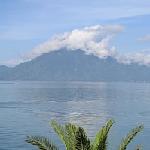
Guatemala Human Rights Commission/USA
.jpg)


.jpg)
Colom Wins Presidency in Guatemalan Runoff
November 5, 2007
By Manuel Roig-Franzia, Washington Post Foreign Service
GUATEMALA CITY, Nov. 4 -- Álvaro Colom, who struggled with internal defections and disappointing poll numbers in the final stages of Guatemala's presidential campaign, won a startling victory Sunday.
With 96.18 percent of polling places counted, Colom led retired army Gen. Otto Pérez Molina 52.71 percent to 47.29 percent.
"This is a new page in the history of the country," Colom told reporters gathered at his Guatemala City home.
Colom, an industrial engineer, had been all but written off in Guatemala's political world, where he was mocked because of his speech impediment, sloped shoulders and lackluster campaigning style. A two-time failed candidate, Colom squandered a huge lead in the polls and by the runoff was trailing retired Pérez Molina in most polls.
Pérez Molina, a forceful and athletic campaigner with thick white hair, had seemed to seize the momentum with a disciplined campaign that emphasized his plan to use the military and an "iron fist" to bring order to a country plagued by drug gangs. In the end, Colom came out on top by promising improved health care and schools for poor, rural and indigenous voters. Colom -- a former vice minister of the economy and a member of a politically active family whose uncle, a former presidential candidate, was assassinated in 1979 -- showed strength across Guatemala. Colom will take over from President Oscar Berger in January.
He won 19 of 22 "departments," the Guatemalan equivalent of states. But Pérez Molina had a strong advantage in Guatemala City, where his anti-crime slogans resonated on blocks dominated by violent thugs.
Cheers went up among Colom supporters at the Hotel Grand Tikal Futura, where campaign operatives and reporters clustered around huge screens displaying tallies. The counting capped a day of low turnouts: with 95 percent of polling places counted, just over 2.6 million votes had been cast, well below the 3.6 million in the first round of voting Sept. 9.
Stunned by nearly empty voting centers in parts of the country, political figures across Guatemala appeared on news programs throughout the day to beg residents to vote. An electoral watchdog group said some polling stations had not registered a single vote three hours after opening. As the day progressed, it seemed that this election might be defined by those who did not vote as much as by those who did.
A few days ago, a cloud of white papers dropped out of the sky -- right onto the head of Wilfredo Quezada. Quezada reached out, he said, and caught one in his right hand. The papers, dumped by helicopter, bore an angry diatribe against Colom.
Quezada, a laborer, had seen similar helicopter dumps smearing Pérez Molina. He was disgusted. And as polling places opened Sunday, Quezada decided to stay away.
"It's like we're going back to the bad times," Quezada said. "I don't like all this dirty campaigning. Why bother to vote?"
Colom, of the National Unity for Hope party, and Pérez Molina emerged as front-runners after a first round of voting Sept. 9 that was preceded by a stunning wave of violence in which at least 50 political workers and candidates were killed.
But their platforms were submerged by fierce, negative campaigning. Colom declared that he did not have "bloodstained hands," a reference to allegations by international human rights groups that Pérez Molina and a military intelligence group he headed might have been involved in political assassinations in the early and mid-1990s, toward the end of the country's 1960-96 civil war. Pérez Molina and his supporters in the Patriotic Party portrayed Colom as corrupt because he had been accused of funneling government money into his campaign, even though the investigation was later dropped.
The sniping continued on election day. Early Sunday, Colom said that armed men had stolen ballots from a polling place, although he later retracted the allegation. Pérez Molina responded by accusing Colom of trying to confuse voters.
Political analysts attributed the apparent low turnout to general disgust with negative campaigning and a lack of enthusiasm for either candidate. In addition, the elections came at the end of a long holiday weekend following the Day of the Dead. Guatemala City, usually crowded and noisy, was quiet Sunday. Thousands of residents had gone to their home towns for holiday events and were not expected to return to cast ballots.
Since qualifying for the runoff, Colom has tried to make up ground on security. Pérez Molina promised to impose martial law, restricting rights of free assembly and movement, for limited periods in areas affected by drug violence. Colom offered the alternative of combating violence with "intelligence," a plan that has drawn skepticism.
"More than 40 percent of Guatemalans are illiterate," said Alejandro Urizar, director of government transparency programs for the advocacy group Citizens Action. "Saying you're going to fight violence with intelligence doesn't have as much impact with them as showing an iron fist."
Home | Site Map | Contact Us
3321 12th Street NE, Washington, DC 20017
This site is maintained by the Guatemala Human Rights Commission/USA
as a means of informing the general public of the Commission's work
on behalf of the people of Guatemala
